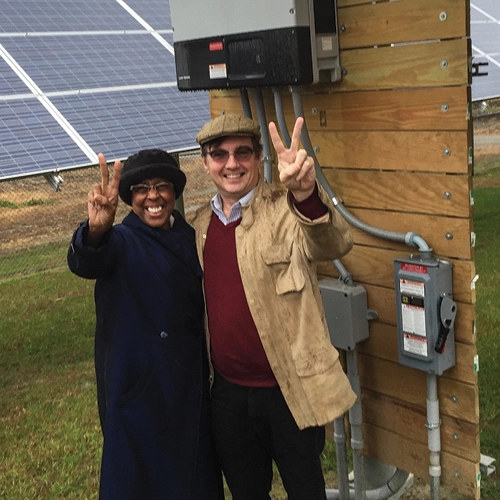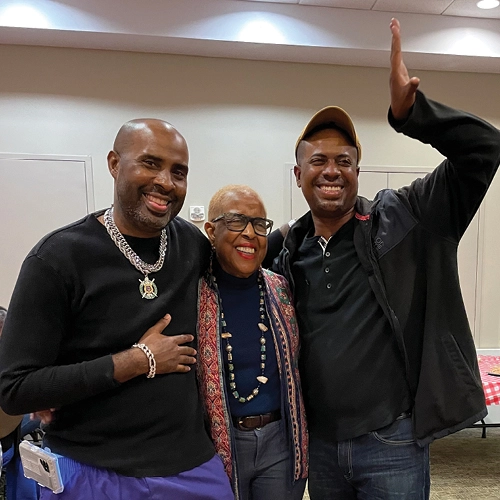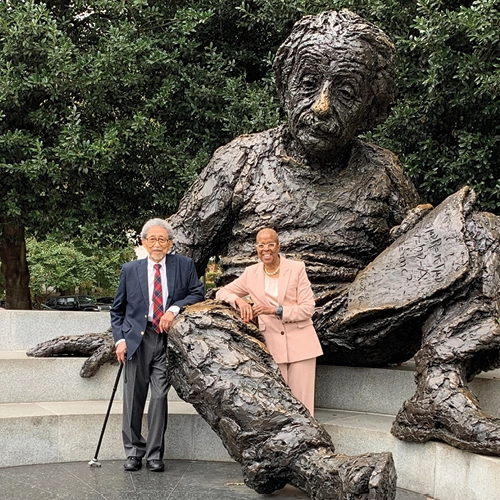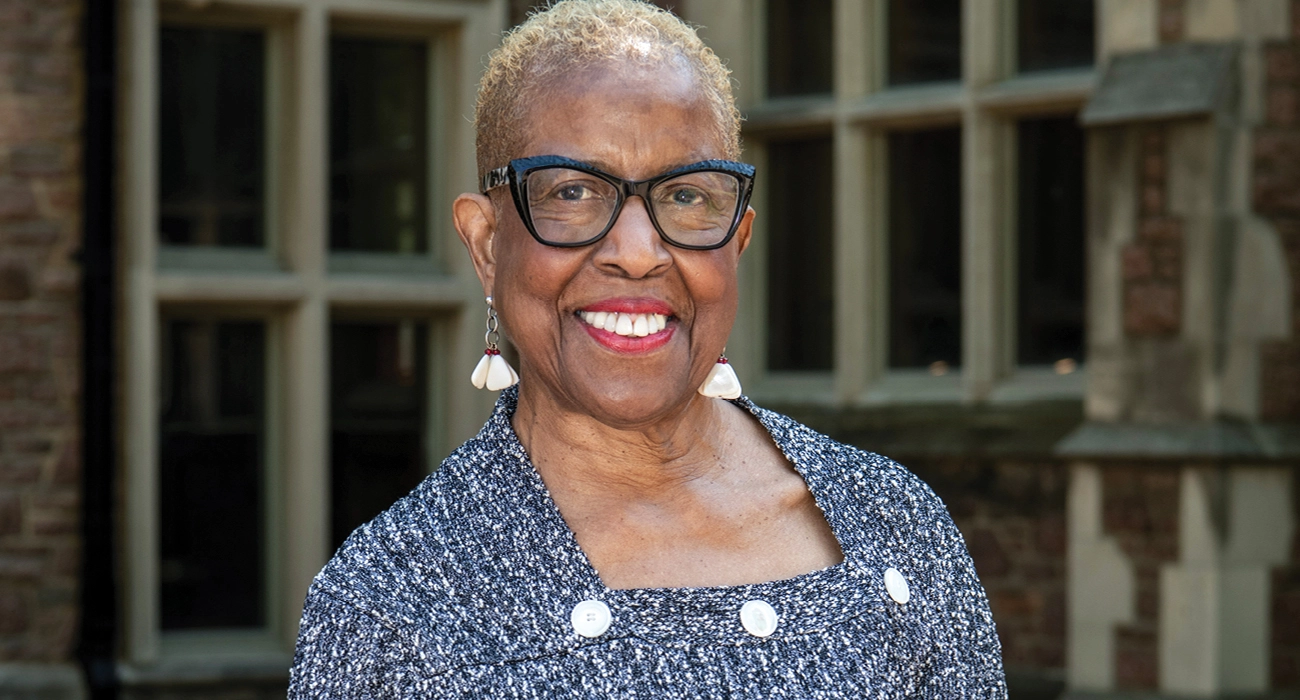Sanitation advocate
Lilia Abron has devoted her career to solving the world’s most pressing water problems
“Everybody deserves to go to the bathroom and have a pleasant experience. All humans have bodily functions for eliminating waste, but for most the experience is not pleasant, and the available toilet options are likely unsanitary and not environmentally safe,” said Lilia Abron, president and CEO of PEER Consultants PC.

Lilia Abron and her colleague John Corliss, senior vice president of PEER Consultants PC, standing in front of a solar array designed and installed by PEER at a wastewater treatment plant in Connecticut.
“The situation in some areas of South Africa is so bad that people are going back to the bucket system, literally lining a bucket with a plastic grocery bag and using that as a toilet,” she said. “When they finish, they take the bag out of the bucket, tie it up and toss it over in the next yard or out in the street. When I see that practice, I can practically see cholera and other infectious diseases transmitted through fecal matter flying in the air. Something must be done.”
Abron, the first Black woman in the U.S. to earn a doctorate in chemical engineering, is globally recognized as a leader in environmental and sanitary engineering. Her mission to address sanitation challenges, particularly those faced by marginalized communities, was born from her realization that these challenges are universal.
“When it comes to solving basic human problems, I find there’s nothing new under the sun,” she said. “Sitting at WashU as a student in 1966, I learned about a town in Kansas that had run out of drinking water in its reservoir and had to take water from the wastewater plant to the drinking water treatment plant. Environmental engineers did what they had to do to solve the problem and keep people healthy.”
Engineers have the skills to address pressing issues in infrastructure, but too often we get held up by negative public sentiment or other entrenched systems that harm the public good.”
— Lilia Abron
Though clever innovations in engineering regularly make the impossible possible, popular support can be harder to come by. Especially when it comes to excrement.
“We can be our own worst enemies,” Abron noted. “People see solutions like that and say ‘ugh, we’re drinking poop water.’ I really hate that description. Water is water is water. We clean it up and use it again, over and over again. Engineers have the skills to address pressing issues in infrastructure, but too often we get held up by negative public sentiment or other entrenched systems that harm the public good.”
Born and raised in the heart of Memphis, Tennessee, Abron's early interest in science led her to study chemistry at LeMoyne College, then to earn a master’s degree in environmental engineering from Washington University in St. Louis in 1968 and a doctorate in chemical engineering from the University of Iowa in 1972. In 1978, Abron established PEER Consultants, an environmental engineering firm focused on providing sustainable, cost-effective solutions to environmental and sanitation problems. Today, the company is a leader in addressing problems of the human environment, with an emphasis on environmental injustice and improving the quality of life for communities worldwide.
Abron’s advice for building a thriving and sustainable sanitation economy? You must have community engagement, but first you must convince the women.

Lilia Abron (center) with two of her sons, Ernest Robinson (left) and David Robinson (right)
“You can’t build a house, and you certainly can’t build a community, without buy-in from women,” Abron said. “Women are often the ones running the show, running the whole household, so first you have to make mama happy if you want to build something that actually works.”
Abron is a longtime member of the International Women’s Forum, an international group of women at the top of their fields who promote efforts by women around the world.
“Being part of the global discourse led by women to support women is especially important right now around issues of climate change and sustainability,” she said.
Abron pointed to the interconnections between water delivery, sanitation, housing, hygiene and economic development and how all are impacted by climate change.
For decades PEER has been building sustainable communities in South Africa, even in areas that aren’t on the electric grid, but environmental changes have brought new pressures.
“In South Africa, we’re dealing with potable water, sanitation, energy and housing issues because there are so many people coming from the countryside for jobs or to escape issues caused by climate change,” Abron said. “Towns are just overrun; they don’t have the infrastructure to support this daily influx of hundreds of people.”
You can’t build a house, and you certainly can’t build a community, without buy-in from women. ”

Even when she’s focused on immediate sanitation issues such as avoiding bucket toilets and infectious disease outbreaks, Abron’s goal isn’t merely to solve the pressing crisis. By setting up public ablution facilities that run on green energy, PEER improves public health while improving infrastructural foundations for additional developments, including energy efficient housing and other facilities. These projects in turn activate the local economy by hiring local tradespeople who are invested in and benefit from the work being done.
This transformative work isn’t only happening half a world away. Abron has long observed the same issues in the U.S., notably in rural areas. Her latest focus is on the Alabama Black Belt Region, where lack of access to water, sanitation and hygiene suffers many of the same problems as in South Africa with the same underlying racial inequities.
“Historically, this area was home to many Black enslaved people. Today, we have social inequity alongside infrastructural and waste management issues,” Abron said. “We need social activists and engineers to work together to solve this combined problem, and that’s exactly what we’re doing. By jumpstarting the sanitation economy, we’re expanding health to wellness, putting in the infrastructure needed to attract businesses and services that support a thriving community.”
Abron describes herself as a bit of a dreamer. But when a dreamer is also an engineer at the top of her game, dreams have a remarkable way of becoming reality.
“If woman can imagine it, woman can do it,” she says.

